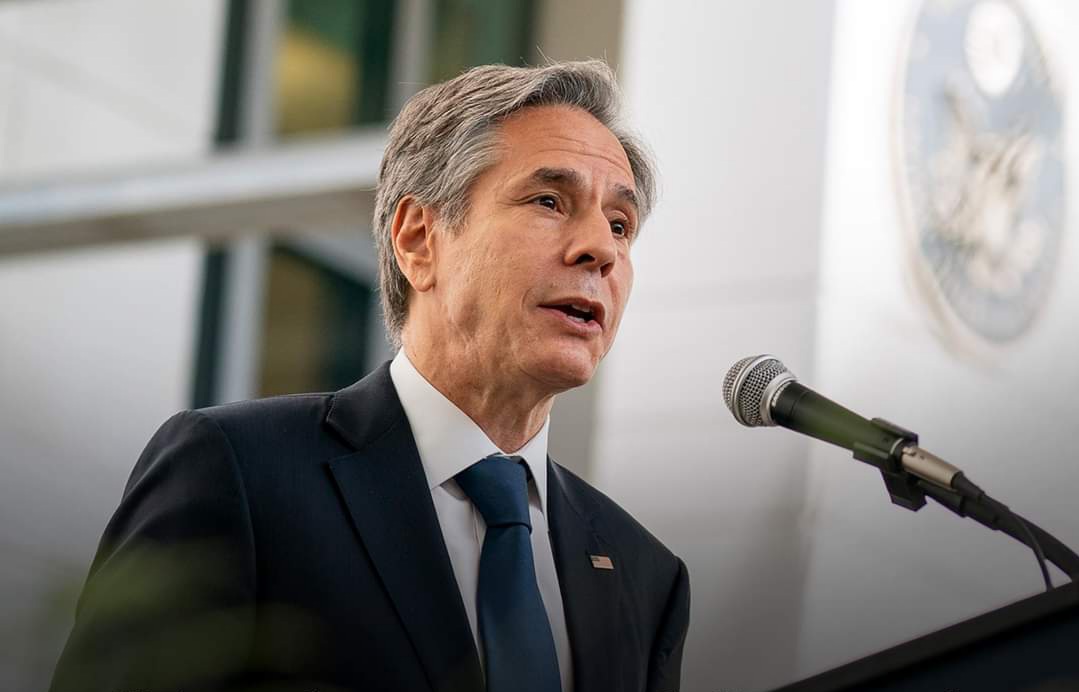In November, the 71st United States (U.S.) Secretary of State, Antony Blinken, visited Nigeria to strengthen the U.S.-Nigeria ties as a way of solving critical issues facing the most populous African nation. Among issues discussed in his interview with Channels TV Maupe Ogun-Yusuf, was the U.S. efforts at tackling the ravaging Covid-19 pandemic.
Excerpts culled by Confiance News from Interview Transcript.
Question: Okay. So people are talking about how this is a resuscitation – your visit to Africa is a resuscitation of U.S. Africa policy, and you’re thinking that this time around, perhaps your policy is going to be tailored to every country’s needs. Is that going to be the case this time around?
Secretary Blinken: Well, yes, it has to be, because even though there are lots of common denominators, all of our partners also have differences, distinct opportunities, distinct needs, so we have to be able to do that. But at the same time, I think there’s a larger framework that we’re looking at because when we’re thinking about the big challenges that we have to meet and face and overcome, as well as the real opportunities that are before us, we know that as a general matter, we can’t do it without Africa.
Over the next 25 or 30 years, one in four people on this Earth will be African. We have one of the most dynamic, youthful populations in the world with extraordinary energy, innovation, entrepreneurship, some of which I’ve seen right here at Innov8, where we’re speaking. And we have to be able to partner with that and to work together, because think about this: When it comes to dealing with climate change, we can’t do it alone, and Africa in particular is a place of tremendous potential for innovation and for finding solutions to the climate challenge.
Building global health security, we have to be able to do that in partnership with Africa. We have a strong track record. We have to build on that. Creating more inclusive economies that bring more people in; here too in Nigeria, the largest economy in Africa, those are the kinds of things that we’re working on.
But across the board, the bottom line is for the United States, when we’re thinking about these big challenges, these big opportunities, it has to be in partnership with Africa.
Question: Well, speaking more specifically about your trip to Nigeria, some people have said that you have come at a most auspicious time, at a time when, at the subnational level, the Lagos State Judicial Panel has submitted a report on “End SARS,” and the United States Government has – that is, the U.S. Mission here in Nigeria has released a statement on that.
The question will be: What lessons do you think – because police brutality seems to be something that a number of countries are struggling with. The United States has had its own fair share. What lessons do you think Nigeria can learn from how the United States has handled its own experience, especially in the wake of the killing of George Floyd?
Secretary Blinken: Well, you’re exactly right that countries are facing this challenge, dealing with this challenge, including the United States. And exactly in our case with instances of police brutality, the Black Lives Matter movement that sprung up from that. But here in Nigeria, I think what’s so essential is this: You have now, in Lagos, the state panel that’s issued its report. That in and of itself is a very important and powerful thing because it brings transparency to these incidents, to the allegations of abuse by the security forces. But what’s even more vital now is for there to be action following up on the report – action at the state level, action at the federal level.
Question: Do you have any specific expectations of that?
Secretary Blinken: Well, I think we have to see once the report is actually published, and we understand exactly what happened. Two things need to follow from that, and this is true across the board, whether it’s in the United States or anywhere else. What are the necessary reforms to make sure that that can’t happen again? How do you build trust between citizens and the security forces, and more broadly, the state? And also accountability to make sure that any individuals who are responsible for committing abuses are actually brought to justice, which is another way of building trust between the citizens and the security forces? That trust is so vital because, of course, Nigeria faces very difficult security challenges in virtually every part of the country. And it’s necessary to deal with them in a way that has trust between the citizens and the state, which has the responsibility of making sure that its citizens are secure while at the same time upholding their rights.
Question: There are always fears, though, and especially when it comes to reports like this. The U.S.-Nigeria relations were somewhat – well, I think what – they warmed up somewhat a little with the sale of the Tucano aircraft. However, before then, there has been some strain in terms of how the fight against Boko Haram was going and U.S. support in that regard. And now, there are fears again that perhaps, as a result of this, perhaps the Leahy laws could come up once again in terms of sale of equipment to the – to Nigeria in terms of assistance. What are your thoughts on that?
Secretary Blinken: There are two things that are important. First, and more broadly, given the vital role that Nigeria plays not just in Africa, but increasingly around the world, given the size of its economy, given the size of its democracy, we need to have a relationship that reflects that. And I think it needs to be more sustained; there needs to be more regular high-level engagement between us, because that’s what the relationship deserves. And I’m committed to that.
But when it comes particularly to the security questions, look, we – there are two things that are important. Yes, the hardware that is necessary to deal with security challenges like the Super Tucanos, that’s important. But as important, is the software, – the human software that has to go along with that. And one of the things that we’ve been doing in partnership with Nigeria is making sure, for example, that people are well-trained not just in how to use the equipment, but how to use it in a way that upholds the rights of citizens. And so, for example, pilots and controllers being trained on how to fly these missions in a way that goes after the bad guys and doesn’t hurt the good guys, to make sure that it’s done in accordance with the law of armed conflict, to make sure that if there are mistakes or problems committed, those are brought to light immediately and corrected.
So it’s the marriage of the hardware that we can provide, but also the human software that’s so important. And it’s that kind of relationship that we want to build going forward.
So, we have a commitment over the next six to nine months. We will be donating around the world, including in Africa, a total of more than a billion vaccines. And we’re doing that primarily through COVAX, so that it gets to countries most in need. And we’re doing it without any political strings attached.
Question: Vaccine inequity continues to dominate the discussions. I know that the United States has been very supportive, providing over 7.5 million —
Secretary Blinken: Yes.
Question: — doses (inaudible) COVAX (inaudible) and on the other – bilaterally, so to speak.
Secretary Blinken: Yes.
Question: However, the inequity remains.
Secretary Blinken: Mm-hmm, it does.
Question: I think just about 5 percent of Africa’s population is vaccinated. Is there anything extra which the United States will be doing to help breach the deficit?
Secretary Blinken: Yes. For us, this inequity is unacceptable. It’s wrong, but beyond being wrong, it’s also incredibly dangerous, including for us. Because as long as the virus is replicated somewhere, it may be mutating. As long as it’s mutating and new variants arise, something may come along that defeats the existing vaccines. And so frankly, it’s in our interest, but it’s also the right thing to do.
So, we have a commitment over the next six to nine months. We will be donating around the world, including in Africa, a total of more than a billion vaccines. And we’re doing that primarily through COVAX, so that it gets to countries most in need. And we’re doing it without any political strings attached.
Second, you may have heard just the other day that President Biden announced a major new investment in vaccine production to make sure that we have for the world the sufficient number of vaccines that will meet the need.
Finally, one of the problems that we see in different countries, including here in Africa, including here in Nigeria, is the last mile problem. The vaccines may exist, we may have the right number, but getting shots into arms is the challenge. There are logistical problems, storage challenges, et cetera. We’ve developed something called the (inaudible) – Global, excuse me, COVID Corps, that brings some of our most talented private sector companies to bring their expertise, working closely with partner countries to figure out what the problems are and to fix them. So all of these things will be happening.
The last thing I’ll say is this: It’s really important that there be increased manufacturing capacity for vaccines in Africa. So whether that can happen in time to address the current pandemic, we’ll see. We want to – we would like to see that happen. But when we’re thinking about the long term – making sure that there’s production here , so that when there is an outbreak it can be addressed much more quickly, efficiently, effectively is really important.
Question: Secretary, I want to ask you one more question, and this is about democracy. As Nigeria goes into the general elections come 2023, you have said that democracy is in recession; we’re seeing across the world. What lessons would you like Nigeria to take away from the elections that happened in the United States in 2020 as Nigeria goes into the elections in 2023?
Secretary Blinken: Well, mostly what I hope is that Nigeria will be a strong lesson for the world – for Africa, for the world. Because first, the fact that President Buhari is respecting term limits is in and of itself a very important and powerful thing when we see in other countries leaders who have decided to ignore them. And I know how strongly he feels about that, having spoken to him the other day.
Second, if the election, as we anticipate and hope, goes off smoothly, freely, fairly, with real participation, that also will send a very, very strong message about democratic resilience, but also I think there has to be something more.
One of the reasons that citizens are losing faith in some places in democracy, in the institutions, is because they feel that it’s not delivering for them. It’s not actually producing things that they need, that they want, and that will make a difference in their lives. And so in different countries, including in Nigeria, when everything is done based on patronage as opposed to actually delivering on the things that people need, that actually erodes trust and confidence in democracy. The more the government can be responsive to the needs of people, the more they’ll say, “You know what? This system works. I want to be a part of it. I want to defend it.” And that, I think, will create enthusiasm around the elections, and that’ll also send a very important message to countries throughout the continent and around the world.
Question: U.S. Secretary of State Antony Blinken, thank you for speaking with us.
Secretary Blinken: Thank you. Good to be with you.
Cover Photo credit: U.S. Mission Nigeria on Facebook.








Leave a comment